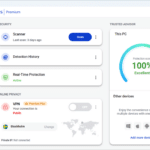Research claims nearly one in ten Android apps is malware

As many as 9 percent of Android apps are fully or partially malware, according to a new piece of research, although the majority of the blame (as ever) lies with dodgy third-party app stores particularly in Asia.
The figure comes from Cheetah Mobile's latest security report for the first half of 2014, which collected 24.4 million sample files during those six months, and found that 2.2 million were viruses.
Do Android users really need malware protection?

Adrian Ludwig, lead engineer for Android security at Google, spoke to journalists prior to Google's I/O developers' conference and said that Android users who install antivirus and other security apps on their devices are no better off than those who don’t. The risk of potentially harmful applications is "significantly overstated" he believes, and there’s no need for anyone to install any form of third party protection.
"I think ... paying for a product that you will probably never actually receive protection from is not a rational reduction of risk -- but people buy things for lots of reasons", he said. Security expert Graham Cluley, who worked for Sophos for 14 years, disagrees. In a blog post he says Ludwig is "wrong, wrong, wrong". Two very opposing views. So who’s right?
Android smartphones shipping from factory with malware

Hardware being shipped with viruses or malware is not a new thing. In the past, there have been flash drives that were accidentally infected at the factory and made it into customers' hands. However, in the new age we live in, where nothing can be trusted, there becomes an increased paranoia in trusting hardware. There is no telling what backdoors or spy software is installed by foreign governments to spy on US Citizens. Hell, the US Government could do it too!
Sadly, it seems Android phones are being shipped pre-loaded with malware according to German security company G Data Software. Before you panic and throw your phone into a lake, please know that so far, this is only discovered to exist in Europe on what seems to be a clone of the popular Galaxy S4. In other words, if you are in the USA you are probably safe -- for now. However, there is no telling where else the trojan Android.Trojan.Uupay.D may secretly be residing.
Android Bitcoin mining malware found on Google Play

Using a mobile device to mine for Bitcoin is hugely impractical. A recent experiment involving 600 quadcore servers managed to create just 0.4 Bitcoins over the course of a year, which makes mining with a mobile a lot like digging in a mostly-spent goldmine with a spoon.
But, in theory, if you could harness the power of enough mobile devices -- hundreds of thousands, or maybe millions -- you might be able to start generating Bitcoins. BadLepricon, a new piece of malware, takes that view and uses your phone’s processing power to mine for new coins. It’s disguised as a harmless wallpaper app, and several instances of it have already been found on Google Play.
New malware uses Android smartphones to mine for digital currencies

Digital currencies can be purchased in their respective markets, or acquired through "mining", which can be done using any computer or smartphone and a special piece of software. Security firm Lookout has just released details on a new piece of malware called CoinKrypt that uses a botnet of Android smartphones to mine for currency.
Because mining is incredibly resource-intensive, the process can severely run down a phone’s battery, eat through a data plan by periodically downloading what is known as a block chain, or a copy of the currency transaction history, and potentially damage hardware by causing it to overheat and burn out.
Some Windows computers are infecting Android devices with malware

Since Android is based on Linux, many users consider it rather safe and secure. However, this is not at all true -- most malware that targets mobile devices, targets Android. For the most part though, it is easy to stay safe by only installing reputable apps from the Play Store.
What if, however, your desktop operating system was infecting your Android device without you knowing? Sadly, this can happen, as some Windows users are finding out. Symantec announces it has found such a case, and it is really nasty.
99 percent of mobile financial malware writers prefer Android

A new report by information research specialist NSS Labs focuses on the evolving landscape of mobile financial malware. It concludes that cyber criminals are adapting to the use of mobile apps to authorize transactions and that 99 percent of current mobile malware is aimed at the Android platform.
As banks add extra functionality to their apps they open up greater capabilities for both customers and the cyber criminals. Many mobile banking apps are based on HTML code making them especially vulnerable to exploits. The report's author, NSS Labs Research Vice President Ken Baylor, says this should prompt more banks to develop secure native apps for mobiles, incorporating fraud-resistant features, if their customers are to stay secure.
Malwarebytes Anti-Malware makes its Android debut

Malwarebytes products have been protecting PCs since 2008, but the company has now decided to broaden its horizons with the release of an Android app.
Malwarebytes Anti-Malware Mobile still has plenty in common with its PC cousin, of course. The app is effective, free, and very easy to use: just launch it, click Scan and watch as your apps are checked for malicious code (we found this generally takes less than two minutes).
Malware on Android begins to spiral out of control

Malware aimed at the Android platform has increased five-fold since July, raising questions on the open-door policy Android has in installing apps. IT company Juniper Networks says the reason for this is the Mountain View, Calif. company's own lax attitude when it comes to oversight.
"With no upfront review process, no one checking to see that your application does what it says, just the world’s largest majority of smartphone users skimming past your application’s description page with whatever description of the application the developer chooses to include", it says. Of course, Juniper's description of how the review process works in Android is generalized and somewhat inaccurate.
5 ways to protect your Android phone from malware

As most of you by now know, last week the Android Market, the official store for applications on Android mobile devices, withdrew a number of apps that had been reported as harmful.
Why is Android encountering challenges where the iPhone isn't? Apps available for download on the Android Market aren't screened as stringently as they are on other public stores such as Apple's. The policy is in keeping with Android's open-source operating system, effectively allowing anyone with programming skill to create apps for mobile devices.
Fragmentation is root cause of Android's recent malware problems

The revelation that Google has pulled 58 malicious applications from the Android Market after they infected over a quarter of a million devices brings the promise, potential and future of the Android platform into question. The threat of mobile malware is no longer theoretical or a way for iOS users to bash Android. It's a very real concern.
Before I criticize Android, I'd like to say that Android does a lot of things very well. This article is not about that. I must also perform the obligatory smartphone disclosure, so that all my biases can be addressed in advance. In the last five years I have owned a Sidekick, smartphones running Windows Mobile 5 through 6.5, a few Nokia mobiles, a Blackberry, several Android devices and most recently a Windows Phone 7 smartphone.
Google removes 21 apps from Android Market over malware

Some Android users are finding out the hard way the perils of an open platform, as Google was forced to take down 21 apps in the Android Market after it was found they contained malware. According to Android Police, which first broke the story on Tuesday, these apps may have been downloaded a combined 200,000 times.
The apps performed a variety of malicious activities, including root exploits, the stealing of phone data, and even acting as a Trojan horse to open the door for the device to download more malicious code. Google quickly pulled the apps from the store after being informed of the issue, and remotely wiped the apps from user devices.
Android growth spurs new mobile malware, SMS Trojan discovered

Security researchers at Kaspersky Lab announced the first malware for the Android operating system to be classified as a Trojan-SMS, the most widespread type of malware on mobile phones.
The malware is disguised as a media player application with the standard Android .APK file extension. When the 13KB file is installed, the mobile device will start to send SMS messages to premium numbers which incur charges on the user's account.
Malwarebytes 5.0 sneaks out, sporting modern new interface and Trusted Advisor

Malwarebytes is quietly rolling out a major new version of its eponymous anti-malware tool with the release of Malwarebytes 5.0. The tool is available in both free and premium versions for desktop and mobile.
MBAM 5.0 is released almost five years after version 4.0 made its bow in May 2019. Like its predecessor, the major change is a sleek new user interface, although this latest effort packs in improved navigation and user-friendliness to go with the modern look.
21 new malware families for Mac systems discovered in 2023

Apple devices have historically had a reputation for being immune to malware, but a new report from Jamf reveals that it's tracked 300 malware families on macOS and found 21 new ones in 2023.
Jamf's latest Security 360 report examined a sample of 15 million desktop computers, tablets and smartphone devices they protect, across 90 countries and multiple platforms (macOS, iOS/iPad, Android and Windows).
Recent Headlines
© 1998-2024 BetaNews, Inc. All Rights Reserved. Privacy Policy - Cookie Policy.